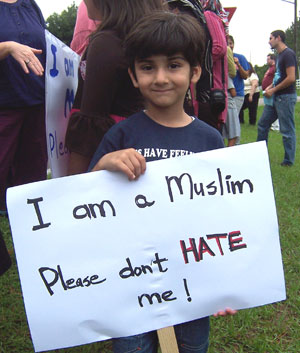
By: Jodie Stephens
Source: The Examiner
If you believe the bigots, Muslims are Australia’s privileged minority.
They are slowly taking over the country through halal food and Islamic prayer.
The effects of September 11, the Bali bombings, and attacks that followed, continue to ripple through Australian society. Now, with each terrorist attack, you can expect prejudiced, inflammatory diatribes from the usual suspects. Alan Jones, for example, shocked no one following April’s Boston bombings when he used it as reason to ban foreign students coming to Australia.
But in the wake of the Woolwich attack last month, in which a British soldier was killed on a London street by two Islamic extremists, it has been more disturbing to see the Muslim slander hasn’t been confined to shock jocks. It has bled into my social circle. Social media posts from good friends, who have always been open- minded and compassionate, have taken an anti-Muslim slant. Medical professionals, teachers and social workers, who abhor racism and homophobia, somehow think portraying Muslims as terrorists is OK.
Equally concerning is the lack of reaction to these posts – barely a digital shrug. This stands in stark contrast to any discriminatory comments posted following the abuse of Adam Goodes at a football game last weekend, when any racist commenters were quickly questioned, criticised and pulled into line.
The existence of halal food does not equal a privileged minority. According to a Newcastle University study published in 2011, the unemployment rate of Muslim Australians between 19 and 24 years old is 18 per cent, compared to 9 per cent of non- Muslims. Once Muslim men reach the age of 65, they are four times more likely to be unemployed. This, despite the fact they are more likely to have a university degree.
There’s also the fear, isolation and vulnerability. In 2003, the Human Rights Commission reported that Australian Muslim women were afraid to walk their children to school for fear of being abused, spat on or mocked. In a survey conducted by the commission, Australian Muslims told of having stones thrown at them, dogs set upon them, cars driven at them, and being physically grabbed and assaulted in supermarkets.
Overall, it paints a pretty bleak picture for a community that is overwhelmingly peaceful. And in victimising them, we create the best possible opportunity for Islamic extremists. A report released by the National Centre of Excellence for Islamic Studies in 2009 suggested Muslims were more likely, through discrimination and economic disadvantage, to feel isolated from Australian society, leading to higher rates of crime and imprisonment, and potentially leading to religious and non- religious radicalism.
So, it’s up to us then – we play a role too. Not through ignorant campaigns against Muslims converting people through halal food and Islamic prayer in schools, but through support, education, compassion and understanding.
You may not agree. But next time you criticise and judge an entire community, ask yourself who the real bad guy is.



